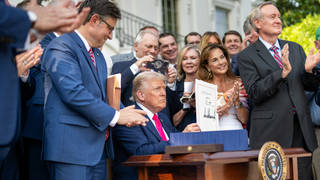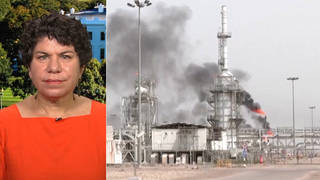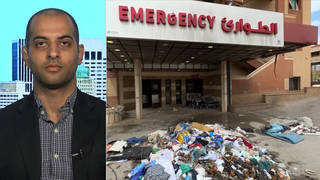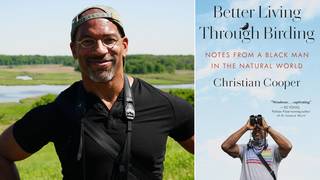
Guests
- Michael Manndistinguished professor and director of the Earth System Science Center at Penn State University.
We speak with leading climate scientist Michael Mann about the catastrophic impact of the climate crisis around the world. He says he and other scientists predicted the extreme weather events now wreaking havoc. “We said that if we don’t stop burning fossil fuels and elevating the levels of carbon pollution in the atmosphere and we continue to warm up the planet, we will see unprecedented heat waves and wildfires and floods and droughts and superstorms,” says Mann. His new book is titled “The New Climate War: The Fight to Take Back Our Planet.”
Transcript
AMY GOODMAN: This is Democracy Now!, democracynow.org, The War and Peace Report. I’m Amy Goodman.
We look now at the catastrophic impact of the climate crisis around the world. This week, the heaviest rainfall — this week, the heaviest rainfall many European countries have seen in at least a century caused rivers to burst their banks, devastating the region. At least 110 people have died in massive floods in western Germany and Belgium. Most of the fatalities are in Germany, where some 1,300 people have also been reported missing. Floods were reported in Luxembourg and the Netherlands, where thousands were told to evacuate Thursday. Germany’s Vice Chancellor Olaf Scholz blamed the deadly floods on man-made climate change.
VICE CHANCELLOR OLAF SCHOLZ: [translated] This is a natural disaster, but the fact that this natural disaster is taking place in this way is certainly connected to the fact that climate change is progressing at a speed that we have observed for a while. That must be another incentive and also an obligation, for all those who have become victims here, for us to do everything we can to stop man-made climate change and prevent such disasters in this scale.
AMY GOODMAN: This comes as new research published in the journal Nature shows portions of the Amazon rainforest in South America now emit more carbon dioxide than they absorb, with deforestation, fires and warming temperatures as the main factors. New data from the Brazilian government shows deforestation of the Amazon rainforest rose for a fourth straight month in June. Greenpeace campaigner Rômulo Batista said it’s part of a disturbing trend under the far-right President Jair Bolsonaro.
RÔMULO BATISTA: [translated] Unfortunately, the month of June brought more bad news for the rainforest. After a century of fires, there was a record level of deforestation. There was over 1,062 square kilometers of destruction across the entire forest. This continues to happen because of the government’s environmental policy and also because it’s encouraged by the National Congress.
AMY GOODMAN: Meanwhile, another punishing heat wave is set to bring triple-digit temperatures to at least 17 million people in the United States and Canada this weekend, as a record wildfire season, fueled by the climate crisis, shows no sign of letting up. Over 1 million acres of the western U.S. and Canada are now in flames.
For more, we’re joined by Michael Mann, distinguished professor and director of the Earth System Science Center, Penn State University. His new book is called The New Climate War: The Fight to Take Back Our Planet.
Welcome to Democracy Now! It’s great to have you with us. Professor Mann, start off by talking about this catastrophe, from the Northwest to the flash floods in Europe.
MICHAEL MANN: Yeah. Thanks, Amy. It’s good to be with you.
It’s unfortunate what we’re witnessing play out. This is what we climate scientists predicted decades ago. We said that if we don’t stop burning fossil fuels and elevating the levels carbon pollution in the atmosphere and we continue to warm up the planet, we will see unprecedented heat waves and wildfires and floods and droughts and superstorms. And guess what. That’s what we’re seeing. And it’s playing out in a profound way right now.
I was, you know, really — I was impressed by the way it came up in this press conference, this joint press conference between Joe Biden and Angela Merkel yesterday, where she was talking about these unprecedented floods that are impacting Germany. And, of course, Joe Biden is the president of a country that is witnessing unprecedented heat extremes and extreme weather events, as well. And so, the fact that both of these countries right now are witnessing the devastating impacts of climate change really drove home the point that she made, that we have to act now. Dangerous climate change is here. Catastrophic climate change is here. And at this point, it’s a matter of how bad we’re willing to let it get.
AMY GOODMAN: So, talk about the climate emergency and the absolute proof that you have. I mean, you were just part of a group of scientists who said there is absolutely no question here, when we look at these fires in Northwest, what’s behind them.
MICHAEL MANN: Yeah. You know, there are sophisticated experiments that climate scientists do now, where — we call them attribution. And we can look at an event like that heat dome out West, and we can run climate models, theoretical climate models, and we can do two different experiments. In one experiment, we pretend the Industrial Revolution didn’t happen, and we keep those CO2 levels, those carbon dioxide levels, at preindustrial levels. In the other simulation, we account for the increase in greenhouse gases from fossil fuel burning from human activity. And we see how often those sorts of events happen in both cases — in this counterfactual case, where we didn’t warm the planet, and in the real world, where we did. And we can estimate how likely that event was before we warmed up the planet and how likely it is now.
And what those estimates suggest, it was a 50,000-year event. You wouldn’t expect to see an event like this once in 50,000 years in the absence of the warming of the planet. Here’s the kicker. What they found is that you wouldn’t expect to see this event even once in a thousand years, given what the models say the impact of climate change has been. And we and other scientists have argued that’s because the models actually aren’t capturing some of the processes, like the way these weather systems become stalled as the jet stream slows down as a result of the warming of the planet. The models don’t take that into account, so they’re still underestimating the impact that we are having on these extreme weather events.
AMY GOODMAN: In other horrific climate news, Michael, new research shows portions of the Amazon rainforest are now emitting more carbon dioxide than they absorb. Can you explain the significance of this and how this not only threatens the rainforest, but the planet?
MICHAEL MANN: Yeah, I can’t overstate the significance of this. Look, we’ve relied upon the fact that there are these natural sinks in the climate system. The oceans take up some of the carbon dioxide. What we call the terrestrial biosphere, the rainforests of the world, in particular, take up some of that carbon dioxide. And because of that, those carbon pollution levels haven’t been rising as fast as they should have, given how much carbon pollution we’re putting into the atmosphere. About half of that carbon pollution was being taken up by these natural carbon sinks. Though the fact that some of these sinks are now turning into sources — not only aren’t they absorbing CO2, taking it out of the atmosphere, they’re actually adding CO2 to the atmosphere — is a real worry. And it reminds us that there are some surprises in store, and they’re not pleasant surprises. This is one of them. And it suggests that we may see even higher levels of carbon pollution than most of the models have predicted. That’s a problem.
AMY GOODMAN: Michael Mann, can you talk about the infrastructure bill and why we’re talking about, really, the future of the planet here?
MICHAEL MANN: Yeah. I mean, there are number of things here. First of all, when it comes to infrastructure, we’ve got to face the fact that we are dealing with a climate crisis now — out in the West, the devastating heat and the wildfires; back East, the flooding events we’ve seen. And that means we need to fund — we need to provide funding for massive increases in our resilience to deal with the impacts of climate change that are already here and that we can’t prevent. But the other side of that is, sure, we have to adapt to the changes that are now inevitable, but we have to prevent the changes that are still preventable. And that means we’ve got to invest massively in renewable energy. We’ve got to use all the mechanisms available to us to disincentivize fossil fuels.
And what I like about this, at least the current draft of the $3.5 billion reconciliation package, is that there is an allowance for what’s known as a clean air standard — or, a clean energy standard, rather, which would require that utilities, by 2030, provide as much as 80% of their energy, their power generation, from renewable sources. I would love to see a price on carbon. I would love to see a cap-and-trade system. But this clean energy standard will make a real difference. And we have to make sure that that package is passed and that that item stays in the bill, because this is the greatest threat we face. Look, the coronavirus threat is this — you know, currently has taken up much of our resources, much of our attention, but that crisis, within a year or two, it will be behind us, and the climate crisis will still loom large. That’s the greatest crisis we face, and we have to deal with it now.
AMY GOODMAN: Can you talk about the connection between the two?
MICHAEL MANN: Sure thing. There are so many lessons that we can learn from COVID-19, from the coronavirus — the importance of listening to science, of listening to scientists. Science denial is deadly. And that was, unfortunately, seen in the hundreds of thousands of deaths that could have been prevented if we had had a president who was willing to do what public health officials were telling him needed to be done. Here’s the thing: Climate change is far more deadly and will cost far more lives if we fail to deal with it. And so, there are other lessons about, you know, the fragility of our existence on this planet and the importance of finding a way to live sustainably on this planet —
AMY GOODMAN: And humans encroaching on the animal world and that kind of interaction.
MICHAEL MANN: Absolutely. You know, our impact on the natural world has led — you know, fossil fuel burning, deforestation has this causal connection with the climate crisis, but we’re also destroying critical ecosystems that are forcing these exotic species out of their normal range, where they come into contact with human beings, and you get these pandemics. And so, so many of the problems we face today stem from the unsustainable way that we are acting right now when it comes to this planet.
AMY GOODMAN: Which brings me to this Greenpeace exposé, you know, Greenpeace recently tricking a lobbyist, a top lobbyist at ExxonMobil, into sharing secrets about the oil company’s efforts to fight climate initiatives in Washington. The lobbyist, Keith McCoy, spoke candidly about his work, thinking he was speaking to a corporate headhunter. This is part of what he said.
KEITH McCOY: Did we aggressively fight against some of the science? Yes. Did we hide our science? Absolutely not. Did we join some of these shadow groups to work against some of the early efforts? Yes, that’s true. But there’s nothing — there’s nothing illegal about that. We were looking out for our investments. We were looking out for our shareholders.
AMY GOODMAN: That’s Exxon lobbyist Keith McCoy, who went on to tell Greenpeace that Exxon’s support for a carbon tax is a public relations ploy, because such a tax will never be implemented. He also identified 11 U.S. senators seen as crucial to Exxon’s lobbying efforts, including the key Democrat, West Virginia Senator Joe Manchin.
KEITH McCOY: Joe Manchin, I talk to his office every week, and he is the kingmaker on this, because he’s a Democrat from West Virginia, which is a very conservative state. And he’s not shy about sort of staking his claim early and completely changing the debate.
AMY GOODMAN: So, this is so key, Michael Mann. Some people might think Joe Biden is in charge. Others might think it’s the other Joe, it’s Joe Manchin. But the idea of what ExxonMobil is suggesting, having him in their pocket, and what he’s defending, talk about the significance of this.
MICHAEL MANN: Yeah, it was sort of a Wizard of Oz moment there. We got a little bit of a peek behind that curtain. You know, pay no attention to the hundreds of millions of dollars the fossil fuel industry has been spending to pollute the public discourse on climate change. So, what we got was a glimpse of what we knew was going on. It was an admission on the part of an ExxonMobil lobbyist of what we have known has been going on for decades, that rather than heeding what their own scientists had said — back in the early 1980s, there was an internal ExxonMobil report that called the potential impacts of climate change catastrophic, but ExxonMobil buried that report. They fired that research division, and instead spent hundreds of millions of dollars in a massive disinformation campaign to discredit the very sort of science that their own scientists had produced.
And so, you know, it really does drive home the fact that there are bad actors involved. In The New Climate War, I talk about the tactics of these bad actors. And as climate change denial becomes impossible because of the impacts that we’re now seeing play out in real time — you can’t deny climate change is happening, so, instead, they’re resorting to all others sorts of tactics in their effort to slow this necessary transition away from fossil fuels. And, you know, getting a few Democratic senators to do their bidding for them has proven to be a very effective strategy of blocking action, because that’s all they care about. They don’t care about why we don’t act on the climate crisis; they just want to make sure that we don’t act on the climate crisis. And we have to make sure that they’re not successful and that we hold our policymakers accountable.
AMY GOODMAN: Professor Mann, what do you think is the most important thing to take away from your book? What is your critical message here?
MICHAEL MANN: There is still time. Don’t let the doomers convince you it’s too late to do anything about climate change. That leads us down the same path of inaction as outright denial. And the inactivists, the forces of inaction, would love nothing more than for environmental progressives to remain on the sidelines because they’re convinced it’s too late to do anything. It isn’t too late, but we have to act, and we have to act now.
AMY GOODMAN: Michael Mann, distinguished professor and director of the Earth System Science Center, Penn State University. His new book, The New Climate War: The Fight to Take Back Our Planet.
Next up, as wildfires rage in California, we look at the corporate profiteering off those who lost their homes and loved ones in the recent fires. Stay with us.













Media Options